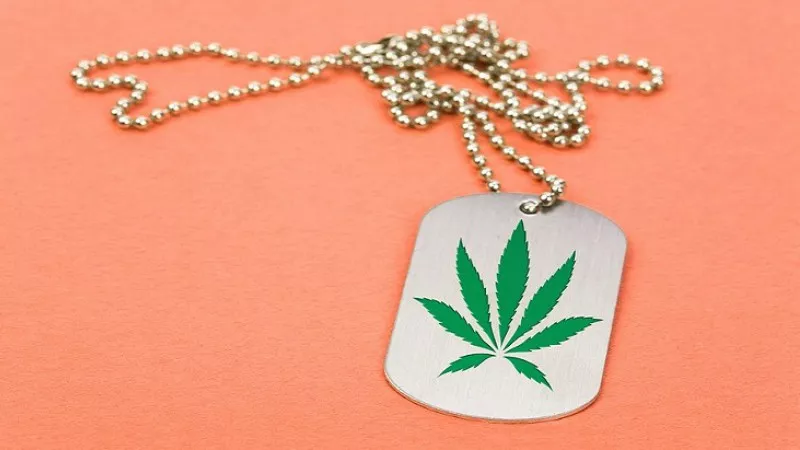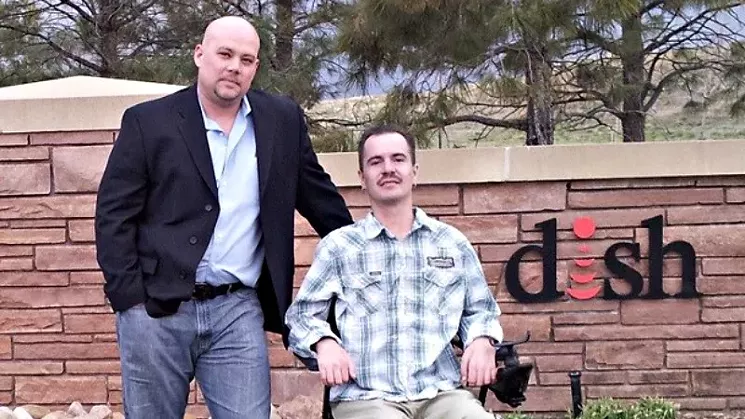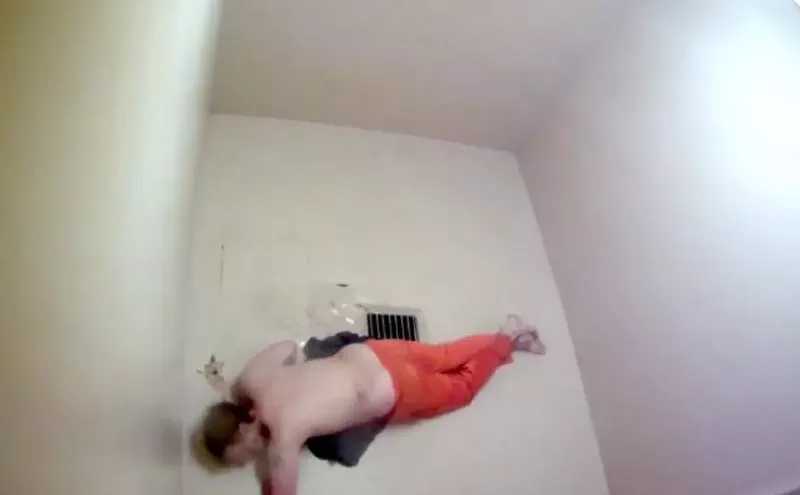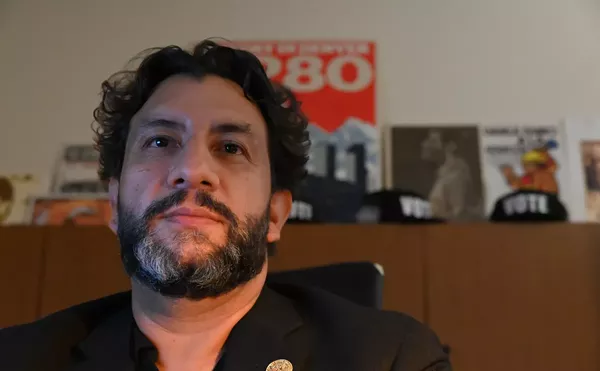Even though Coloradans voted to legalize medical marijuana use in 2000 and recreational pot sales in 2012, employers in the state can still legally sack workers who score positive for cannabis on drug tests. But the National Organization for the Reform of Marijuana Laws' local branch is trying to change that. Denver NORML executive director Jordan Person says the organization is currently looking for Colorado legislators to sponsor a bill that would prevent businesses from, in her words, "firing people on Wednesday for performing a lawful activity on Saturday."
The best example for why critics believe the current rules must go — the case was cited by HBO's John Oliver in a program about unfair marijuana laws last year — involves Brandon Coats, whose story we've been covering since 2012.
Coats, a paralyzed medical marijuana patient, was fired by DISH for failing a drug test two years earlier even though he was never accused of having been stoned on the job and consistently received exemplary work reports. As such, he filed a complaint over the issue in Arapahoe District Court, and when he lost there, his attorney, Michael Evans, took the matter to the Colorado Court of Appeals. That court also rejected Coats's argument, but Evans didn't give up. He subsequently submitted what he described to us as a final document in an effort to get the Colorado Supreme Court to weigh in — and in January 2014, the jurists agreed to do so.
But the Colorado Supreme Court June 2015 ruling on Evans's challenge to Colorado's Discriminary or Unfair Employment Practices statute, technically known by the numbers 24-34-402.5, wasn't the victory for which Coats had hoped.
"By its terms," the ruling stated, "the statute protects only 'lawful' activities. However, the statute does not define the term 'lawful.' Coats contends that the term should be read as limited to activities lawful under state statute. We disagree."
The opinion added: "We find nothing to indicate that the General Assembly intended to extend section 24-34-402.5’s protection for lawful activities to activities that are unlawful under federal law," the authors continue. "In sum, because Coats's marijuana use was unlawful under federal law, it does not fall within section 24-34-402.5’s protection for 'lawful' activities."
More recently, Judd Golden, an attorney who authored Denver NORML's proposed 2016 social marijuana use ballot initiative (the measure failed to make that year's ballot), penned language intended to address this problem.
The text is on view below, but Person offers this summary.
"The first thing it would do is amend the unlawful prohibition of legal activities as a condition of employment, to clarify that legal activities include legal activities under Colorado law, such as adult marijuana use," she notes.
In addition, Person continues, Golden's new text would amend the Discriminatory or Unfair Practices act's references to "a positive drug test for metabolites of marijuana — because that's what they're testing for when someone has a drug test for cannabis. And that science is so antiquated."
Indeed, advocates have noted for years that traces of marijuana linger in the system of users for significant periods of time and can result in positive drug tests even for sober individuals. Note that way back in 2011, Westword cannabis writer William Breathes tested nearly three times over a .5 nanogram standard being floated for driving impairment even though he'd last consumed cannabis fifteen hours earlier, prior to a full night's sleep.
Not that Denver NORML is arguing in favor of on-the-job marijuana use being allowed. Instead, Golden's language prohibits firing or penalizing a worker unless he or she "used, possessed or was impaired by marijuana during the hours of employment."
The latter can be determined by what Person calls "impairment testing" — a protocol developed by a metro-area firm called Predictive Safety, accessible online at alertmeter.com. "It's so much smarter for businesses to use impairment testing in 2018 instead of the old urine-dipstick method," she allows — and to prove it, Predictive Safety will offer live demonstrations of its approach at the Colorado State Capitol for NORML's upcoming lobby days, the next of which will take place on February 21.
Person points out that "currently, the only people in the entire country that are mandated to be drug tested are federal employees — and there are also a few other jobs, like pilots. But we're not messing with any of those rules. This is Colorado-specific legislation that would not change any federal preemption — but it would provide a legislative fix for Coats v. DISH. And that would be huge."
Here's the aforementioned language for the proposal.
MARIJUANA CONSUMER EMPLOYMENT PROTECTION BILL
PROPOSED 2018 COLORADO LEGISLATION
Amend the following sections:
CRS § 24-34-402.5. Unlawful prohibition of legal activities as a condition of employment
Add a new section 3, to read:
3. "LAWFUL ACTIVITY" IN THIS SECTION INCLUDES ACTIVITIES THAT ARE LAWFUL UNDER THE LAWS OF THE STATE OF COLORADO AND ANY GOVERNMENTAL SUBDIVISION THEREOF, REGARDLESS OF WHETHER SUCH ACTIVITY IS LAWFUL UNDER THE LAWS OF THE UNITED STATES OR ANY OTHER STATE OR NATION.
CRS § 24-34-402. Discriminatory or unfair employment practices
Add a new section 8, to read:
8. UNLESS A FAILURE TO DO SO WOULD CAUSE THE EMPLOYER TO LOSE A MONETARY OR LICENSING-RELATED BENEFIT UNDER FEDERAL LAW OR FEDERAL REGULATIONS, IT SHALL BE
CONSIDERED AN UNFAIR EMPLOYMENT PRACTICE, AND AN EMPLOYER MAY NOT DISCRIMINATE AGAINST A PERSON IN HIRING, TERMINATION, OR ANY TERM OR CONDITION OF EMPLOYMENT, OR OTHERWISE PENALIZE A PERSON, IF BASED UPON THE FOLLOWING:
a. THE PERSON'S STATUS AS A MEDICAL MARIJUANA CARDHOLDER OR PATIENT; OR
b. A POSITIVE DRUG TEST FOR MARIJUANA COMPONENTS OR METABOLITES, UNLESS THE PERSON USED, POSSESSED, OR WAS IMPAIRED BY MARIJUANA DURING THE HOURS OF EMPLOYMENT.
c. FOR PURPOSES OF THIS SECTION 8, “IMPAIRED BY MARIJUANA” SHALL MEAN THE PERSON’S PHYSICAL OR MENTAL CAPABILITIES TO PERFORM HIS OR HER JOB FUNCTIONS ARE ADVERSELY AFFECTED BY MARIJUANA, BASED UPON INDIVIDUALIZED REASONABLE SUSPICION, AND SPECIFIC, OBJECTIVE, AND CLEARLY EXPRESSED FACTS AND EVIDENCE THAT THE PERSON IS UNDER THE INFLUENCE OF MARIJUANA DURING THE HOURS OF EMPLOYMENT.

Audio By Carbonatix
[
{
"name": "GPT - Billboard - Slot Inline - Content - Labeled - No Desktop",
"component": "23668565",
"insertPoint": "2",
"requiredCountToDisplay": "2"
},{
"name": "STN Player - Float - Mobile Only ",
"component": "23853568",
"insertPoint": "2",
"requiredCountToDisplay": "2"
},{
"name": "Editor Picks",
"component": "17242653",
"insertPoint": "4",
"requiredCountToDisplay": "1"
},{
"name": "Inline Links",
"component": "18838239",
"insertPoint": "8th",
"startingPoint": 8,
"requiredCountToDisplay": "7",
"maxInsertions": 25
},{
"name": "GPT - 2x Rectangles Desktop, Tower on Mobile - Labeled",
"component": "24956856",
"insertPoint": "8th",
"startingPoint": 8,
"requiredCountToDisplay": "7",
"maxInsertions": 25
},{
"name": "Inline Links",
"component": "18838239",
"insertPoint": "8th",
"startingPoint": 12,
"requiredCountToDisplay": "11",
"maxInsertions": 25
},{
"name": "GPT - Leaderboard to Tower - Slot Auto-select - Labeled",
"component": "17676724",
"insertPoint": "8th",
"startingPoint": 12,
"requiredCountToDisplay": "11",
"maxInsertions": 25
}
]














